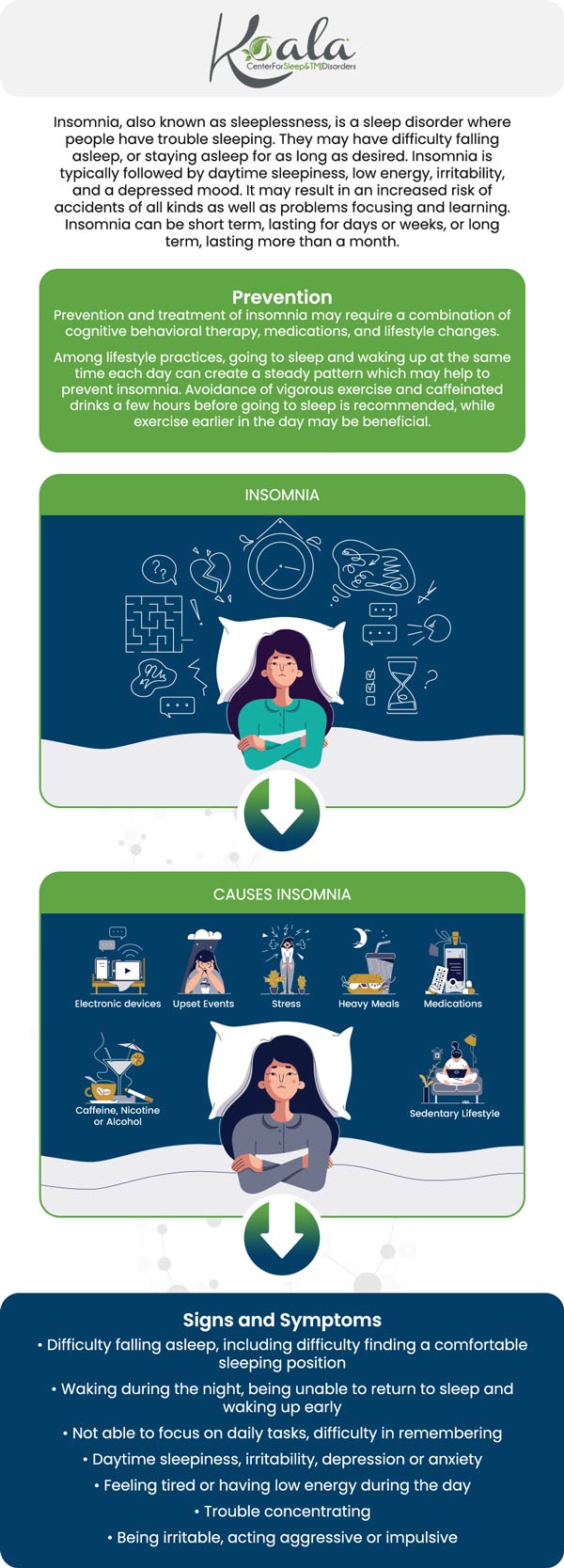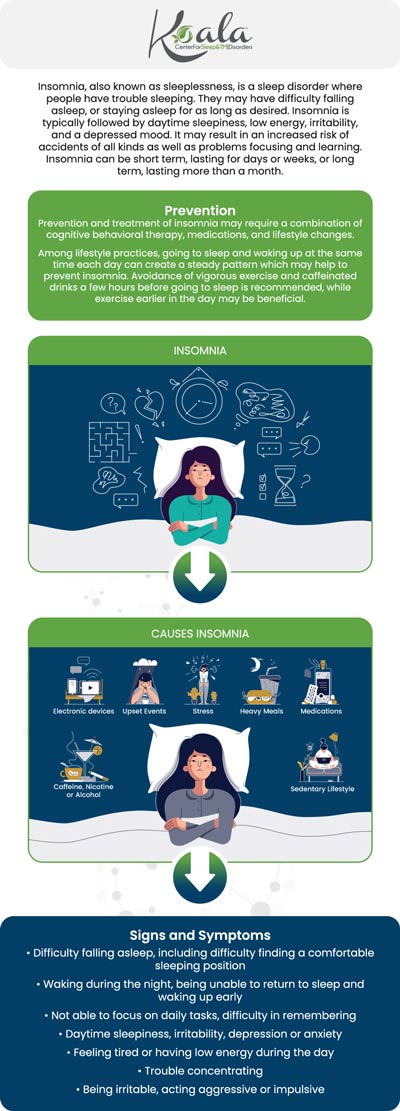What Are the Long-Term Consequences of Untreated Insomnia?
If you are in search of treatment for your sleep disorder and would like more information. Call us at one of our Koala® Center For Sleep & TMJ Disorders locations today or request an appointment online. We serve patients from all over the USA. Locations in Bloomington IL, Peoria – Dunlap IL, El Paso TX and Wausau WI.




Table of Contents:
What are the 3 types of insomnia?
What problems can insomnia cause?
What tests are done for insomnia?
What happens if insomnia goes untreated?
Sleep is one of the most fundamental functions of life and serves many purposes, including restoring and healing the body, compartmentalizing memories and experiences, and assisting in establishing new neural pathways in the brain. On average, adults need to sleep 6 to 8 hours a night in order to function at the optimal level, yet research has shown that over half of the adult population does not get enough sleep, with many of these people chronically sleep-deprived.
– Transient Insomnia — Transient insomnia is defined as the inability to sleep from anywhere between a few days to a week. It can be caused by:
– Worry about a future event
– Stress
– A persistent issue, such as personal problems
– Illness, especially if it causes congestion (stuffy nose), or physical pain
– Jet lag, especially from long flights
– Sleeping in a new environment, such as when traveling
– Excitement about a holiday or event
– Sleeping at different times than usual
The effects of this type of insomnia are transient (short-lasting); therefore, people should be able to return to their normal sleep once they have passed.
– Acute or Short Term Insomnia — The second type of insomnia is much like the first, however, it can last for a lot longer several weeks to over a month. This can be caused by:
– A longer illness with symptoms that persist through the night (coughing, congestion, frequent need to use the washroom)
– Stressed or upset about a recurring problem
– Bereavement after a loved one passes away
While the causes of acute insomnia are typically more severe and longer-lasting than the ones associated with transient insomnia, they are still fairly short-term and should not cause issues for longer than one month.
– Chronic Insomnia — Chronic insomnia is defined as trouble falling or staying asleep nearly every night for longer than three months; in some cases, it can last for years. Approximately 1 in 10 people suffer from chronic insomnia, making it a very prevalent condition. At this stage of insomnia, people often suffer from the effects of sleep deprivation, which can have far-reaching consequences on virtually every aspect of health. Causes for chronic insomnia are typically long-lasting and may include:
– Bad sleeping environment
– Mistiming sleep schedule
– Long term health problems
– Long term stress and anxiety
Insomnia can cause a myriad of problems that negatively impact physical health, social relationships, and mental health, and may include:
– Fatigue
– Mood Issues
– Stress
– Brain Performance
– Weight Gain
– Less Interest in Sex
– Weaker Immune System
– Diabetes
– Heart Disease
– Higher Risk of Accidents
Insomnia is a complex condition that affects everyone differently; therefore, it can be difficult to accurately diagnose. The diagnostic process may include:
– Physical Exam — The first step in diagnosing insomnia is to take a detailed look at a person’s physical health. Our physical health can be very revealing about our sleeping habits and often shows signs of medical problems related to insomnia.
– Sleep Habits Review — To determine an individual’s sleep-wake patterns and their level of daytime sleepiness, a sleep insomnia may conduct a review of sleep habits in the form of a questionnaire.
– Sleep Study — If the cause of insomnia is difficult to identify, or signs of another sleep disorder are present (such as sleep apnea or restless legs syndrome), it may be recommended to undergo a sleep study. This typically involves an overnight stay at a sleep center where tests are performed to monitor and record a variety of body activities during sleep.
Consequences of untreated insomnia may include:
– Impaired ability to concentrate
– Poor memory
– Difficulty coping with minor irritations
– Decreased ability to enjoy social relationships
– Reduced quality of life
– Worsening of depression and/or anxiety
If you have a sleep disorder that includes insomnia, come to Koala® Center For Sleep & TMJ Disorders today. Insomnia can cause serious health problems and should be treated as soon as possible, regardless of how long it lasts. We believe everyone has the right to receive quality care for insomnia and are proud to serve patients from all across the United States.
That constant battle to fall asleep—or the frustration of waking up and being unable to get back to sleep—is known as insomnia, and it can impact every aspect of your health. Our sleep specialists are dedicated to helping you find the root cause of your sleeplessness. We go beyond just managing symptoms by providing a comprehensive evaluation of your unique sleep challenges. We will partner with you to create a personalized treatment plan designed to restore your body’s natural sleep cycle, allowing you to finally get the deep, uninterrupted rest you deserve.

Additional Services You May Need
▸ KoalaKIDZzz®
▸ Sleep Apnea
▸ Snoring
▸ TMJ Disorder
▸ Fatigue
▸ Sleep Disorders
▸ Weight Loss
▸ CPAP Alternative
▸ Oral Appliances




